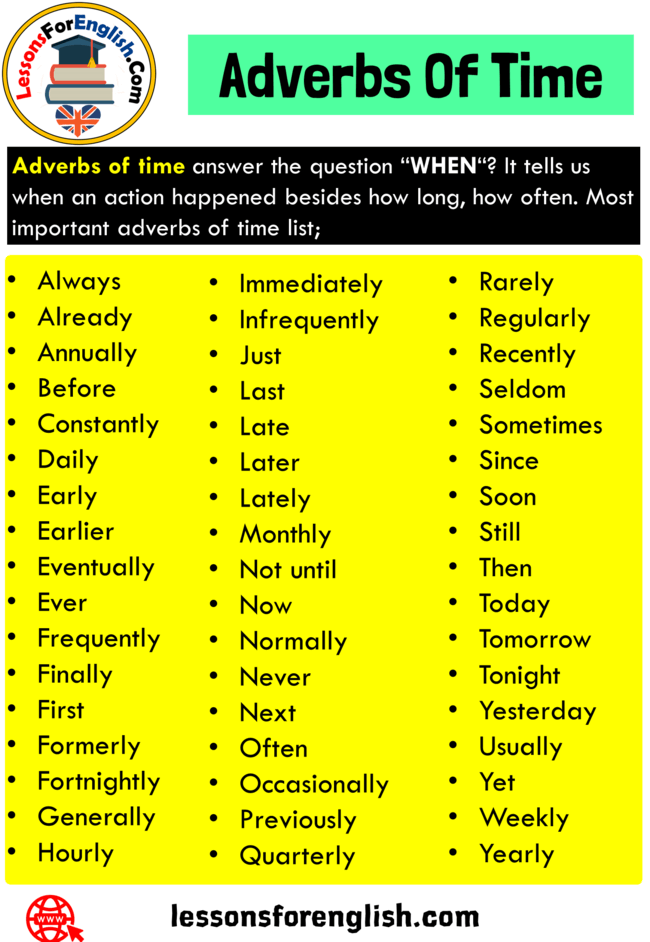Example Of Adverb Of Time / List of Adverbs: 300+ Common Adverbs List with Useful ... / July 29, 2020february 19, 2019 by the english teacher.. Adverbs of time mainly modify verbs and tell us when something happens. Yesterday, the day before, ago, last week/month/year. Learn list of 50+ popular time adverbs in english. An adverb clause of time shows when something happens. Today, yesterday, later, now, last year.
'yet' is an adverb of time which tells us that something hasn't happened, but it's expected to happen. Some other how often adverbs express the exact number of times an action happens and are usually placed at the end of the sentence: In this study guide, you will learn about these adverbs through real examples. Read examples of adverbs of time in these sentences. • tomorrow our fortune will be sealed.

The teacher's grammar of english with answers:
The adverbs of time tell us when an action takes time, its duration and frequency. However, we can sometimes place adverbs of time at the beginning of the sentence to put an extra emphasis on the time or duration being described. I was sitting in front of her door all that time. Since + point in time. Today, yesterday, later, now, last year. Descriptive examples, helpful explanations and these adverbs of time are often used: Adverbs of time tell us at what time (when) or for how long (duration) something happens or is the case. Adverbs of time mainly modify verbs and tell us when something happens. The examples are italicized for easy identification. Yesterday, the day before, ago, last week/month/year. The teacher's grammar of english with answers: Adverbs of time tell us when an action happened. An adverb of time is an adverb that describes when the action of a verb is carried out.
*it was a boy that he gave the jobs just to. Each sentence contains an example of an adverb of time; Placed at the start of a sentence. It's used at the end of a sentence, either on its own when. 2.a complete list of adverbs of time.
Now, today, daily, early and soon are all adverbs of time.
Examples of adverbs of time: I was sitting in front of her door all that time. The word which expresses time and tell us when something happens is called adverb of time. #adverbsoftime #englishgrammar #pardhaighar #banomisaalpakistankiin this video we'll discuss about adverbs of time which tell us when an action happened. Adverbs modify other words, such as verbs and adjectives, and can. Adverbs of time answer the question when? Some other how often adverbs express the exact number of times an action happens and are usually placed at the end of the sentence: Adverbs of time describe when something happens. Adverbs of time, adverbs of manner, adverbs of degree, adverbs of place, adverbs of frequency. In this chapter the adverbs of time will be explained. All adverbs that tell us when can be placed at the beginning of the sentence to emphasize the time element. Placed at the start of a sentence. A word that tells the time of an action is called adverb of time.
#adverbsoftime #englishgrammar #pardhaighar #banomisaalpakistankiin this video we'll discuss about adverbs of time which tell us when an action happened. An adverb of time is an adverb that describes when the action of a verb is carried out. I said i could wait for her as long as she wanted. What is an adverb of time? Don't forget to check out the.

Adverbs that tell us when are usually placed at the end of the sentence.
Adverbs of time, adverbs of manner, adverbs of degree, adverbs of place, adverbs of frequency. Adverbs of time and frequency. Adverbs of time answer the question when? Your analysis of 'i watched tv last night' is a good example of our knowledge about tv that makes it clear that it refers to duration rather than a point in time. In order to avoid complexity, if any situation is not common or important, we often need to. Adverbs of time tell us when an action happened, but also for how long, and how often. Before, after, as, when, while, until, as soon as, since, no sooner than, as long as etc. Yesterday, the day before, ago, last week/month/year. Some examples of adverbs of time are: July 29, 2020february 19, 2019 by the english teacher. 'yet' is an adverb of time which tells us that something hasn't happened, but it's expected to happen. Soon, late, today, to night, early, tomorrow, yesterday, then, now, etc. She arrived home three hours later.

0 Comments